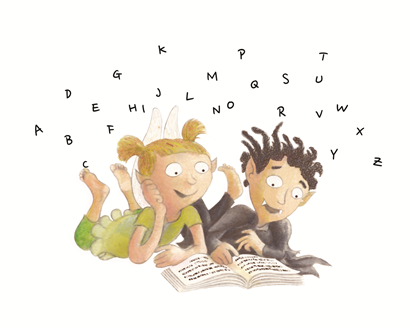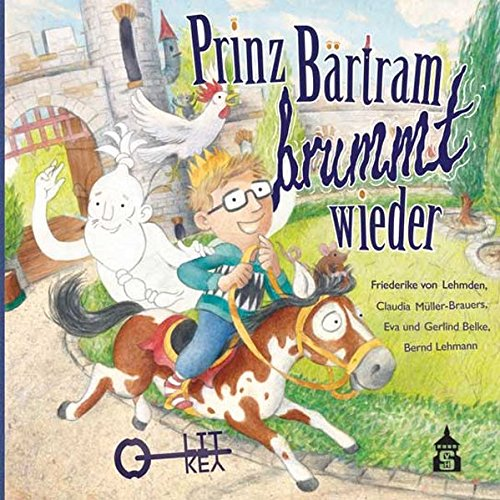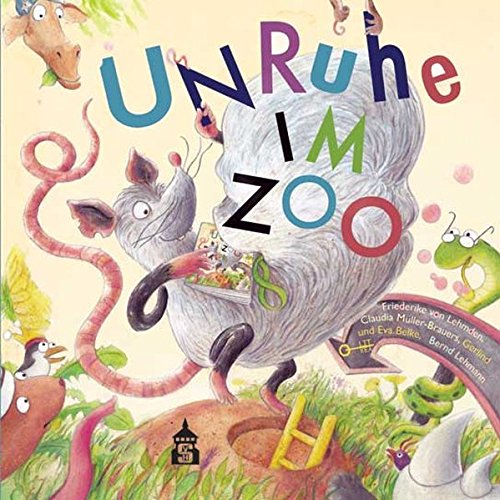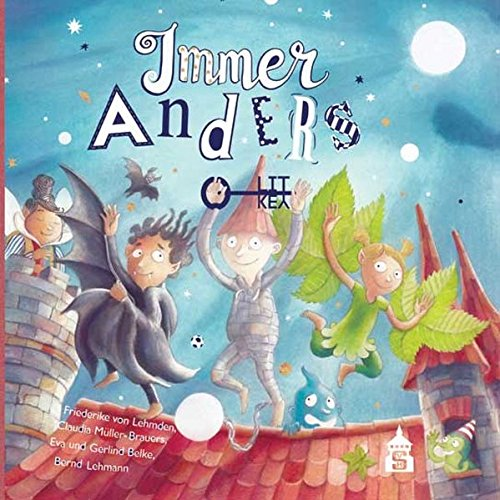Actual Projects
LitKey
“Literacy as the key to social participation: Psycholinguistic perspectives on orthography instruction and literacy acquisition”, joint project; PIs Prof. Dr. Eva Belke, Prof. Dr. Stefanie Dipper (Bochum); Prof. Dr. Sonia Kandel (Grenoble); Prof. Dr. Müller-Brauers (Hannover) funded by the Volkswagen Foundation in the funding line “Key Issues for Research and Society”; further information at: www.linguistics.rub.de/litkey/Eltern/Kinderbuch/Mitarbeiterinnen.html


 ©
Bernd Lehmann
©
Bernd Lehmann


 ©
Bernd Lehmann
©
Bernd Lehmann


 ©
Bernd Lehmann
©
Bernd Lehmann


 ©
Bernd Lehmann
©
Bernd Lehmann
-
Project description “LitKey”
In the language-didactic part of the project we investigate whether and how kindergarten children can unconsciously acquire grammatical knowledge by having picture book stories suitable for children read out to them.
In the project, we have developed special picture books to improve grammar with which, in conjunction with grammar-promoting songs, our aim is to intensively support 3.5 to 5-year-old children with German as their first and second language in small groups over a period of about four months. The grammatical abilities of the children are recorded before and after the children’s support programme. We also compare the grammatical abilities of the children with those of children who do not participate in this special programme in order to examine the effectiveness of the support.
The research results obtained will be directly incorporated into the kindergarten’s support practice and thus benefit all children. In order also to give the children who were not part of the language support group the opportunity to benefit from the books and songs, we will also carry out a training concept for early education specialists following the support. In this way, the work with picture books and songs can be integrated into the everyday routine of the kindergartens and all children can benefit from this language support concept.
-
References
Müller-Brauers, Claudia; von Lehmden, Friederike & Lehmann, Bernd (i.V.): Zu Besuch in der Roboterwelt. Bilderbuch zum impliziten Grammatiklernen. Baltmannsweiler: Schneider.
Müller-Brauers, Claudia; von Lehmden, Friederike & Lehmann, Bernd (i.V.): Mensch, Oma! Bilderbuch zum impliziten Grammatiklernen. Baltmannsweiler: Schneider.
von Lehmden, Friederike; Müller-Brauers, Claudia & Lehmann, Bernd (i.V.): Mutig sein. Bilderbuch zum impliziten Grammatiklernen. Baltmannsweiler: Schneider.
von Lehmden, Friederike; Müller-Brauers, Claudia & Belke, Eva (i.V.): Implizite Förderung des Grammatikerwerbs mit Kinderliteratur. Handbuch zu den LitKey-Bilderbüchern (Arbeitstitel). Baltmannsweiler: Schneider.
von Lehmden, Friederike; Müller-Brauers, Claudia; Belke, Eva; Belke, Gerlind & Lehmann, Bernd (2017): Unruhe im Zoo. Bilderbuch zum impliziten Grammatiklernen. Baltmannsweiler: Schneider Verlag Hohengehren.
von Lehmden, Friederike; Müller-Brauers, Claudia; Belke, Eva; Belke, Gerlind & Lehmann, Bernd (2017): Immer anders. Bilderbuch zum impliziten Grammatiklernen. Baltmannsweiler: Schneider Verlag Hohengehren.
von Lehmden, Friederike; Müller-Brauers, Claudia; Belke, Eva; Belke, Gerlind & Lehmann, Bernd (2017): Prinz Bärtram brummt wieder. Bilderbuch zum impliziten Grammatiklernen. Baltmannsweiler: Schneider Verlag Hohengehren.
von Lehmden, Friederike; Müller-Brauers, Claudia; Belke, Eva & Belke, Gerlind (2017): Implizite Förderung des Grammatikerwerbs mit Kinderliteratur. Begleitheft zu den Bilderbüchern „Immer anders“, „Unruhe im Zoo“, „Prinz Bärtram brummt wieder“. Baltmannsweiler: Schneider.
von Lehmden, Frederike; Porps, Lisa & Müller-Brauers, Claudia (2017): Grammatischer Sprachinput in Kinderliteratur – eine Analyse von Genus-Kasus-Hinweisen in input- und nicht inputoptimierten Bilderbüchern. In: Forschung Sprache, 5(2), 44-61.
Reading digital children’s literature aloud
“Reading digital children's literature aloud”, teaching and research project with Prof. Dr. Christiane Miosga and Ines Potthast, Institute for Special Education, Leibniz University Hannover, to investigate the potential of digital children’s literature for child literacy development and the development of inclusive educational concepts in kindergartens and primary schools.
Information for students: Students have the opportunity to participate in this project as part of their project work (Module N, M.Ed. and Module SKT 2, M.A.) or their master’s thesis.
-
Project description “Reading digital children’s literature aloud”
Today, digital media such as smartphones or tablets are firmly established in the world of children. Digital children’s literature plays an increasingly important role in children’s early media experiences. However, there is a lack of clearly defined (linguistic)-didactic quality criteria and instructions for using the media-based literacy learning potential of picture book apps. The project therefore aims to investigate the potential of digital children’s literature for child literacy development and to make it usable for the development of inclusive educational concepts in kindergartens and primary schools.
-
References
Barkow, Ingrid & Müller, Claudia (Hg.) (2016): Frühe sprachliche und literale Bildung. Sprache lernen und Sprache fördern im Kindergarten und zum Schuleintritt. Tübingen: Narr Francke Attempto Verlag.
Müller-Brauers, Claudia; Miosga, Christiane & Potthast, Ines (i.V.): Narrative learning through picture book reading – limitations and challenges of digital media.
Miosga, Christiane (2017): Stimme und Leseverhalten in Eltern-Kind-Interaktionen mit Bilderbüchern und / oder digitalen Medien? In: Hannken-Illjes, Kati et.al. (Hrsg.): Stimme-Medien-Sprechkunst. Baltmannsweiler: Schneider Verlag, S. 174-188.
Miosga, Christiane (2016): Zum Einfluss digitaler Medien auf das Lesen und die Literacy Entwicklung. In: Stitzinger, U.; Sallat, Stephan & Lüdtke, Ulrike (Hrsg.): Sprache und Inklusion als Chance?! Expertise und Innovation für Kita, Schule und Praxis. Idstein: Schulz-Kirchner-Verlag, 223-230.
Rohlfing, Katharina & Müller-Brauers, Claudia (accepted): International Perspectives on Digital Media and Early Literacy: The Impact of Digital Devices on Learning, Language Acquisition and Social Interaction. Routledge/Taylor & Francis.
Barkow, Ingrid & Müller, Claudia (Hg.) (2016): Frühe sprachliche und literale Bildung. Sprache lernen und Sprache fördern im Kindergarten und zum Schuleintritt. Tübingen: Narr Francke Attempto Verlag.
Müller-Brauers, Claudia; Miosga, Christiane & Potthast, Ines (i.V.): Narrative learning through picture book reading – limitations and challenges of digital media.
Miosga, Christiane (2017): Stimme und Leseverhalten in Eltern-Kind-Interaktionen mit Bilderbüchern und / oder digitalen Medien? In: Hannken-Illjes, Kati et.al. (Hrsg.): Stimme-Medien-Sprechkunst. Baltmannsweiler: Schneider Verlag, S. 174-188.
Miosga, Christiane (2016): Zum Einfluss digitaler Medien auf das Lesen und die Literacy Entwicklung. In: Stitzinger, U.; Sallat, Stephan & Lüdtke, Ulrike (Hrsg.): Sprache und Inklusion als Chance?! Expertise und Innovation für Kita, Schule und Praxis. Idstein: Schulz-Kirchner-Verlag, 223-230.
Rohlfing, Katharina & Müller-Brauers, Claudia (accepted): International Perspectives on Digital Media and Early Literacy: The Impact of Digital Devices on Learning, Language Acquisition and Social Interaction. Routledge/Taylor & Francis.
Picture books – the linguistic-didactic criteria
“Bilderbücher sprachdidaktisch” (“Picture books – the linguistic-didactic criteria”), teaching project with Celina Diroll, Institute for Special Education, Leibniz University Hannover, on the systematization of picture books according to linguistic-didactic criteria with the collaboration of Vera Schorege and Lisa Willenborg.
-
Project description “Picture books – the linguistic-didactic criteria”
In the teaching project “Bilderbücher sprachdidaktisch” ("Picture books – the linguistic-didactic criteria "), in collaboration with Celina Diroll and with the assistance of Vera Schorege and Lisa Willenborg picture books are systematized according to language-didactic criteria and combined to form a corpus of picture books. The analyses of the picture books include both aspects of content and a linguistic view of the grammatical focus, as well as didactic approaches such as examples of implementation and suggestions for child language production. Inclusive approaches are also examined in the picture book analyses, so that the results of the project can be used for language-didactic work with heterogeneous learning groups in kindergartens and primary schools.
On the question of authenticity in the application of linguistic methods in the context of science mediation in the student laboratory
“Zur Frage von Authentizität bei der Anwendung linguistischer Methoden im Rahmen der Wissenschaftsvermittlung im Schülerlabor” [On the question of authenticity in the application of linguistic methods in the context of science mediation in the student laboratory], together with Prof. Dr. Björn Rothstein, Bochum, funded by the Professional School of Education Bochum in the context of the research programme “Wissenschaftsvermittlung im Schülerlabor” [Science mediation in the student laboratory], edited by Angelina Firstein. The primary focus of this project is the research of authenticity in teaching-learning contexts within the framework of science mediation in the student laboratory.
Completed Projects
November 2013–October 2016: On the role of authenticity in the linguistic mediation of science in the student laboratory – using the example of Ruhr German together with Prof. Dr. Björn Rothstein, Ruhr-Univ. Bochum, supported by the Professional School of Education within the framework of the research programme “Science mediation in the student laboratory”, edited by A. Betz
February 2014–February 2015: “DaZ-related (German as a Second Language) promotion of scientific propaedeutic discourse competence in the upper secondary school”; a teaching project in the DaZ module “German for students with a migrant history. Language promotion in all subjects” (DSSZ), Ruhr-Universität Bochum, within the framework of the funding programme “Working together – strengthening subject-specific language support in theory and practice”, funded by the Mercator Institute.
2014–2015: “Preschool children read aloud – observations on imitative linguistic action”; together with Dr. Linda Stark, Ruhr-Univ. Bochum (now: Univ. Würzburg), sponsored by the Professional School of Education
